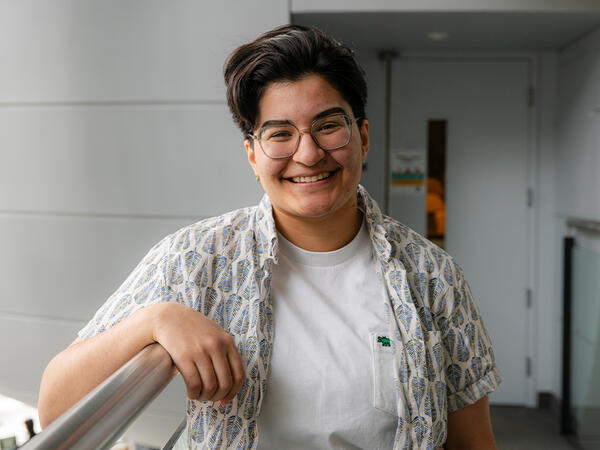What is your academic background and how does it complement pharmaceutical sciences research?
I began undergraduate studies in the Life Sciences program at U of T in 2011 and quickly enrolled into the Pharmaceutical Chemistry specialist program for my focused program of study. While taking courses in the Pharm Chem program from 2012 – 2015, I was able to build up my knowledge and skill set in pharmaceutical sciences, and more importantly, I was able to directly learn from professors who are world-class experts in the pharmaceutical field. In addition, I was able to enhance my training with summer research experiences within these world-class research labs from the Leslie Dan Faculty of Pharmacy. I think these valuable experiences motivated me to continue into grad school in the PharmSci program and are instrumental for my smooth transition into pharmaceutical research.
What led you to the Wu lab?
My first research experience was in a research project with Prof. Shyh-Dar Li at the Ontario Institute for Cancer Research in 2014. There, I studied the development of a lipid-based nanocarrier formulation of an anti-cancer drug and fell in love with the field of drug delivery. While looking for a new research project in 2015 to continue my learning, I was captivated by Prof. Wu’s stellar research in polymer-lipid nanocarriers for anti-cancer therapy due to its similarity to my previous project. I was fortunate enough to be accepted by Prof. Wu into an NSERC-funded summer research program and it was here that I developed many of my research skills. While in the Wu lab, I was also introduced to the idea of using nanotechnology for designing closed-loop/ “smart” devices for precise on-demand insulin delivery (at high blood sugar) to vastly improve the lives of people with insulin-dependent diabetes. Highly inspired by this state-of-the-art research, I continued into a MSc program in the Wu lab and then transferred to the PhD program in which I have expanded my research to study formulations and delivery of other therapeutic hormones for improving diabetes management.
What are some of the challenges you’ve had to overcome within your research?
Starting off my MSc project in an entirely new field (diabetic treatments), at the time, was a bit of a challenge since my prior research experiences were all regarding nanocarriers for anti-cancer drug delivery. However, thanks to the highly knowledgeable and more senior researchers in our group (Drs. Jason Li, Michael Chu, and Chanson He), I was able to rapidly learn everything I needed from them. With regards to other challenges, I think research itself is always challenging, which is actually one of the best parts about it – the work never gets boring. Designing and testing novel drug delivery systems, especially closed-loop (glucose-responsive) systems is also very challenging given its complexity. Thus, I am grateful to be working alongside the brilliant minds of Dr. Amin GhavamiNejad, our diabetes subgroup, and Dr. Giacca’s group from U of T Physiology/ Medicine that allows us to develop solutions to these challenges.
What impact do you hope your research has on society broadly?
I hope the research I’ve conducted and continue to do will have a positive impact on society from both a scientific and clinical standpoint. Making a positive difference has always been the reason for why I became a grad student at U of T. Currently, our most promising research has been the development of a prototype microneedle transdermal patch for the glucose-responsive delivery of glucagon for the prevention of hypoglycemia (low blood sugar), a common yet potentially fatal complication associated with insulin-dependent diabetic individuals. We hope to continue the development of the device towards scale-up, large animal studies, and eventually, clinical trials. We hope that the glucagon patch will, one day, be able to make life safer for patients and easier for caregivers by preventing hypoglycemic events and removing the fear of insulin overdose.
What are the unique contributions that pharmaceutical scientists make to diabetes research?
Pharmaceutical scientists have already made a plethora of contributions to diabetes research and are continuing to do so. Some of the contributions include: designing/ discovering new therapies, developing more stable formulations of biological therapeutics, developing longer-lasting formulations, developing more rapid-acting formulations, developing closed-loop systems for tighter glucose regulation, developing novel dosage forms for more efficient drug delivery and/ or enhanced efficacy, and many others. Thus, pharmaceutical scientists play a vital role in the creation of new and improved therapies for diabetes management.
More News
Image

Faces of PharmSci: Mahya Rezaeifarimani
Supervised by Prof. Shirley Wu, PhD student Mahya Rezaeifarimani is developing smart nanoparticles to help make radiation therapy work better for brain tumours by targeting low-oxygen areas that often make treatment less effective.
Read More
Image

Dean Lisa Dolovich reappointed for second term
Professor Lisa Dolovich has been reappointed for a second term as Dean of the Leslie Dan Faculty of Pharmacy, University of Toronto, effective July 1, 2025, to December 30, 2030.
Read More
Image

Pharmacy Summer Camp gives high school students insight into pharmacy profession
A new summer camp based at the faculty will give high school students a range of experiences in pharmacy and pharmaceutical sciences.
Read More
